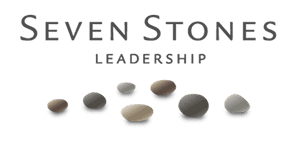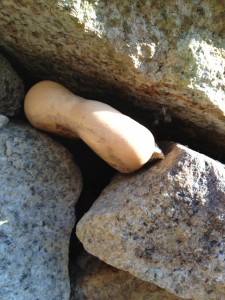At Seven Stones we talk a lot about context and underlying assumptions, and how we, and our lives, are shaped by them. So when my husband, Jon, spotted a butternut squash left behind in the fall harvest that was wedged between the rocks of our patio, I was delighted. This now flat fruit grew between the cracks – stunted growth, but grew nonetheless, and could now, still, be part of our family’s nourishment.
What shapes us? I thought. What are all the ways I am shaped that I am not even aware of? There are infinite factors, variables, so many just in the domain of what I don’t even know I don’t know.
I also wonder: am I willing to be shaped? I know, for example, that there are moments at Seven Stones with my colleagues where I feel resistance – would she just do it and stop talking about it! Moments with my husband, children, parents, in-law’s, friends … we do not always agree, and I even have some habitual resistance. Am I willing to listen? To take in their words and ideas? To even be shaped by them?
Children are some of the greatest shapers, because we cannot simply leave or have a completion conversation. We are literally trapped by our love of them, in a similar way the squash was trapped by the rocks. Children, in turn, act like great rivers, cutting a course through the territory of our lives. We have to be shaped by them or else we will suffer the results of our resistance, and cease to receive the nourishment available in interaction.
So this squash put me smack in the middle of the conversation about interdependence. We modern Americans think we are in-dependent, unto ourselves, but we are shaped all the time, already, by those around us, the messages, the advertising, the furniture we sit on, the houses we live in, the jobs we have. We are inter-dependent with life already. How relieving to know this and to relax into this process of shaping! It’s a practice of acceptance and awareness.
Take this inquiry to become more intimate with your interdependence today:
- What shapes you? Who? Think people, places, things and ideas.
- What are you unwilling to be shaped by? What assumptions lead to this unwillingness?
- What is available when you relax into the shaping that is already happening?
- What does it feel like to resist? What does it feel like to accept?
- What is the opposite of resistance when it is unhealthy to be shaped? When acceptance or shaping is not appropriate?
And remember, we too are forces of shaping, rocks sometimes, rivers others, squash in the cracks.




